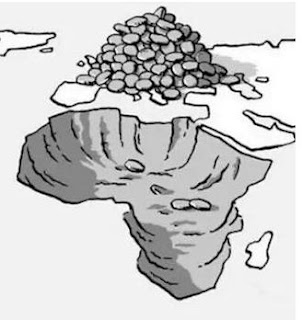Cobalt is one of the world’s most sought-after minerals because it is a key ingredient in the batteries that power most electric vehicles (EVs). Global sales of passenger EVs – excluding hybrids – are expected to soar from 3.3m in 2021 to 66m in 2040. The volume of sales of cobalt into the sector will rise four or fivefold over the coming decade. The World Bank estimates that demand for cobalt production will increase 585% by 2050.
"Pierre" works in Fungurume, in the Democratic Republic of Congo’s southern mining belt. His basic wage is the equivalent of £2.60 ($3.50) a day, but if he works through lunch and puts in hours of overtime, he can make up to about £3.70. Not that lunch is worth waiting for: he claims he is given just two small bread rolls and a carton of juice. If he takes a day off, money is deducted from his wages. If he is sick and misses more than two days in a month, more money is cut. “You can’t even argue. If you do, you’ll be fired,”
Pierre explains, "The mine makes so much and we make so little,” he says. “The relationship between us and the mine is like a slave and a master.”
The harsh and dangerous working conditions endured by miners in the DRC’s informal, or artisanal, cobalt mines – of child labour and miners being buried alive as tunnels cave in – have provoked an international outcry in recent years, forcing the western technology and automotive brands that rely on the mineral to look for ways to source “clean” cobalt, free from human rights abuses. Some companies in the cobalt supply chain have promised to stop sourcing from artisanal mines and instead get the mineral from large-scale industrial mines, which are seen as a safer option both for workers and corporate reputations.
Pierre is not working at an artisanal mine, however. He is employed, via a subcontractor, at Tenke Fungurume mine (TFM), one of the country’s biggest industrial mines, which is 80% owned by the Chinese company China Molybdenum(CMOC).
Some workers are often employed through subcontractors, allege they are victims of severe exploitation, including wages as low as 30p an hour, precarious employment with no contracts, and paltry food rations. In a number of mines run by Chinese companies, workers made allegations of discrimination and racism reminiscent of the colonial era.
Kolwezi is the DRC’s cobalt capital, a city so defined by mining that some communities sit on the rim of the giant craters that have been excavated in search of copper and cobalt. It is mining on a massive scale, highly mechanised and dependent on cutting-edge technology but powered by thousands of workers – more than 10,000 at TFM – who, like Pierre, are employed as mineral processors, drivers, mechanics, welders, security guards and general workers.In the last 15 years, Chinese companies have begun to enter the mining business, buying out North American and European companies so that they now control the majority of the cobalt and copper mines in southern DRC. And with this change, Congolese workers say, has come abuse, discrimination and racism. They say they are insulted, in some cases beaten, and claim they are paid less than Chinese workers who do the same job. They allege that Chinese supervisors disregard their experience and put production before safety. One Congolese worker at TFM described sitting through a two-hour meeting in Chinese, only to be given a two-minute translation at the end. Almost 70% at TFM, for example – are hired through sub-contractors. The use of subcontractors can leave workers in an extremely precarious position: often hired on short-term contracts, or no contract at all, with limited benefits, low pay and the threat of termination always hanging over them.
Josué Kashal, a lawyer for Centre d’Aide Juridico-Judiciaire, a local organisation that represents miners, says the use of subcontractors can lead to the big mines being able to avoid accountability. Kashal claims are more than 50 subcontractors that have been used by the Kamoto Copper Company (KCC) mine, which is owned by the Swiss commodities and mining giant Glencore.
“Glencore is using many subcontracted workers, so employees depend on the subcontractor, not Glencore. This way they don’t have responsibility and can end a contract at any time,” says Kashal. While some workers said they hoped to get hired directly by KCC, saying it offered better wages than other mines, 44% of KCC’s workers are employed through sub-contractors.
Congo Dongfang International Mining (CDM) mine and refinery workers say they are employed for as little as £88 a month. “Payslips” seen by the Guardian were written only in Chinese on a pencil-thin strip of paper. CDM is wholly owned by Huayou Cobalt, a Chinese conglomerate with interests in every step of the cobalt supply chain, from mining to cathode production. Renault and Daimler, the parent company of Mercedes-Benz, name CDM among their suppliers.
A report launched today by UK-based corporate watchdog Raid and Congolese lawyers from the Centre d’Aide Juridico-Judiciaire, says many multinational mining companies – and the subcontractors they hire – create poorly paid jobs that keep workers in poverty. Workers said they deeply resented the way they were treated, but felt powerless to protest. “It’s a shocking situation, but I can’t leave the job because there is no other choice,” says one. “Where can I get another job?”
“Cobalt is an essential mineral for the green transition, but we must not turn away from the abusive labour conditions that taint the lithium-ion batteries needed for millions of electric vehicles,” said Raid director Anneke Van Woudenberg


No comments:
Post a Comment